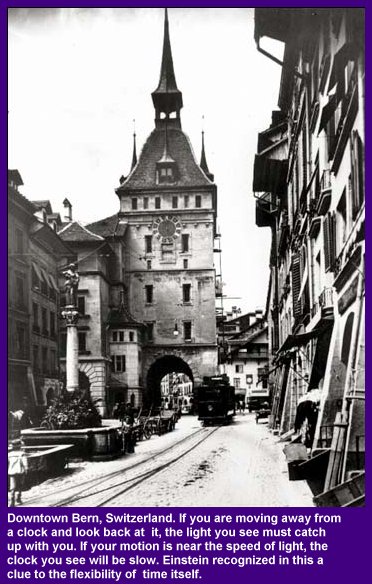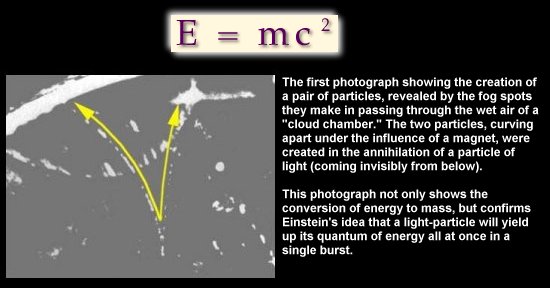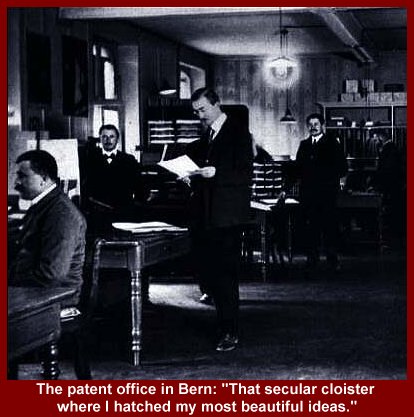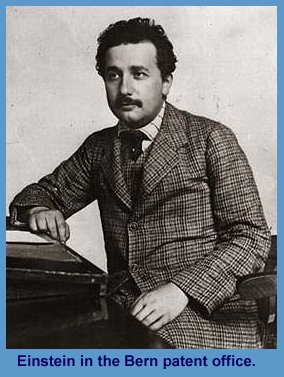 subnormal."
subnormal."Einstein
One biography says he
did not speak till three years old. In Einstein: The Life And Times author says,
"Nothing in Einstein's early history suggests dormant genius. Quite the contrary. The
one feature of his childhood about which there appears no doubt is the lateness with which
he learned to speak. Even at the age of nine he was not fluent, while reminiscences of his
youth stress hesitancies and the fact that he would reply to questions only after
consideration and reflection. His parents feared that he might be subnormal."
subnormal."
He was not a good student, withdrawn: "was withdrawn from the world even as a boy -- a pupil for whom teachers held out only poor prospects."
When his father "asked his son's headmaster what profession his son should adopt, the answer was simply: 'It doesn't matter; he'll never make a success of anything.'"
"As remembered by Einstein in later years, this backwardness had its compensations, since it indirectly helped guide him towards the field he was to make his own. 'I sometimes ask myself,' he once said, 'how did it come that I was the one to develop the theory of relativity. The reason, I think, is that a normal adult never stops to think about problems of space and time. These are thing which he has thought of as a child. But my intellectual development was retarded, as a result of which I began to wonder about space and time only when I had already grown up."
...
"By the time he was twelve Einstein had attained , in his own words, ' a deep religiosity.'"
He had a "desperate need to find order in a chaotic world."
He did not like school. Had dropped out as a teenager.
"at the age of sixteen Einstein had discovered a paradox by considering what would happen if one could follow a beam of light a the speed of light -- the result being 'a spatially oscillatory electromagnetic field at rest.'"
For nine years he quietly worked on this insight and others and in 1904 at the age of 25 he had his ideas on paper. In 1905 he published them. One of the papers was theory of relativity that revolutionized the view of the universe. On of the other papers was used for his Nobel Prize years later.
He did not have a doctorate or even an advanced degree. He was not at a university working with others. He was alone.
He  worked two months
as a mathematics teacher and then was an examiner at the patent office in Bern,
Switzerland. In 1905, he published several papers that fundamentally changed man's view of
the universe. One was a paper on photoelectric law. One was on the special theory of
relativity. It was the culmination of his thoughts he had written in an essay at age 16.
Another paper gave a mathematical footnote to the special theory of relativity
establishing the equivalence of mass and energy. The energy E of and quantity of matter,
with mass m, is equal to the product of the mass and the square of the velocity of light,
c." This relationship of energy to matter is expressed in the equation E = mc2."
worked two months
as a mathematics teacher and then was an examiner at the patent office in Bern,
Switzerland. In 1905, he published several papers that fundamentally changed man's view of
the universe. One was a paper on photoelectric law. One was on the special theory of
relativity. It was the culmination of his thoughts he had written in an essay at age 16.
Another paper gave a mathematical footnote to the special theory of relativity
establishing the equivalence of mass and energy. The energy E of and quantity of matter,
with mass m, is equal to the product of the mass and the square of the velocity of light,
c." This relationship of energy to matter is expressed in the equation E = mc2."
It would be years later in 1919 that this theory would bring him worldwide acclaim.
From the 1920s to the end of his life in 1955, he searched for what he called a unified field theory. He said the universe is exactly engineered: "God is subtle but he is not malicious."
In Albert Einstein by Leopold Infeld: "As a child and as a youth he wished to be left alone. The ideal life was, for him, that of least interference from the outside world. He was comparatively happy in Switzerland because there men are left to themselves and privacy is respected. The results of the thoughts he started when he was sixteen were published in 1905. This is the year in which his four celebrated papers appeared. His fame among physicists began some four years later. Einstein told me, 'Before I was thirty, I never met a real physicist.' In Einstein's case it was luck that he did not."
He  said his ideas
"came from God." He worked eight hours a day at the Patent office. He tried to
gain a position of teacher at the local university in Bern, Switzerland. He sent a paper
on Relativity in 1907. It was rejected because they said it was incomprehensible.
said his ideas
"came from God." He worked eight hours a day at the Patent office. He tried to
gain a position of teacher at the local university in Bern, Switzerland. He sent a paper
on Relativity in 1907. It was rejected because they said it was incomprehensible.
Bitter, he waited a year, and tried again. In 1908, Bern University let him teach but with no salary and so he had to continue to work at the Patent office. In 1909, at the age of 30 he was given a job teaching and began his teaching career without having and advanced degree.
In, From Einstein In America, Jamie Sayer writes, "he did not receive and appointment to a university until 1909, when he became Associate Professor of Theoretical Physics at Zurich University. Years later he quipped that he had not met a real physicist until he was 30 years old. While the gist of this remark is true, it should be noted that he was visited by Max von Laue in Bern in 1906."
"The  job at the Patent
Office had been a great blessing because it had freed him from the academic pressures to
produce and publish results that so often compel you scientists to 'write a lot of
superficial stuff and become a busybody in order to get ahead.' Instead he was able to
work at his own pace, motivated only by the 'pure joy of learning.'"
job at the Patent
Office had been a great blessing because it had freed him from the academic pressures to
produce and publish results that so often compel you scientists to 'write a lot of
superficial stuff and become a busybody in order to get ahead.' Instead he was able to
work at his own pace, motivated only by the 'pure joy of learning.'"
From Clark's book, Einstein: The Life and Times, "from 1902 until 1905 Einstein worked on his own, an outsider of outsiders, scientifically provincial and having few links with the main body of contemporary physics. This isolation accounts for his broad view of specific scientific problems -- he ignored the detailed arguments of others because he was unaware of them. It also shows a courage beyond the call of scientific duty, submission to the inner compulsion which was to drive him on throughout life and for which he was willing to sacrifice everything."
"Any one of the four main papers which he published in 1905 would have assured him a place in the textbooks. All were comparatively short, and all contained the foundations for new theories."
Three year period of separation.
His first marriage did not work out. He took care of her financially, I think. I think I read that he gave his money from the Nobel Prize to her. Father is divorced. Difficult course.
Einstein started work at the Swiss Patent Office in 1902. He worked there seven years. The first three were for publishing the papers in 1905 and the last four were time period for him to pay the price to get his career.
"As Ronald Clark wrote in his biography, Einstein: The Life and Times, 'The Einstein of the early 1900's was not only a scientist of minor academic qualifications who had launched an obscure theory on the world. He was also the man who failed to fit in or to conform, the disrespector of professors ... who although approaching the age of thirty still seemed to prefer the company of students.'"
...
"...the virtues of self-discipline, of concentration, of dedication to an ideal, of an attitude which can be described as firm or as relentless according to taste. Years later, when colleagues were discussing the sing-minded determination with which he had followed his star without regard for others, one listener noted: 'You must not forget. He was a German.'"
...
"He had no interest in learning a new language, nor in food nor in new clothes. 'I'm not much with people,' he continued, 'and I'm not a family man. I want my peace. I want to know how God created this world. I am not interested in this or that phenomenon, in the spectrum ofthis or that element. I want to know His thoughts, the rest are details.'"
...
"This aim was matched by a belief: 'God is subtle, but he is not malicious.' With these words he was to crystalize his view that complex thugh the laws of nature might be, difficult thought they were to understand, they were yet understandable by human reason. If a man worried away at the law behind the law -- if, in Retherford's words, he knew what questions to ask nature -- then the answers could be discovered. God might pose difficult problems but He never broke the rules by posing unanswerable ones. What is more, He never left the answers to blind chance --"God does not play dice with the world.'"
...
"handbook on pacifism, Die Friedensbewegung, he declared that "a human being who considers spiritual values as supreme must be a pacifist." More poignantly in the light of future events, he later told Die Wahrheit of Prague that if another war broke out he would "unconditionally refuse to do war service, direct or indirect, and would try to persuade my friends to take the same stand, regardless of how the cause of the war should be iudged.' Not long afterwards he was persuading his friends to do the reverse."
"During the first postwar years pacifists had strong popular support, not only in Germany, but throughout a continent exhausted by four years of bloodletting."
...